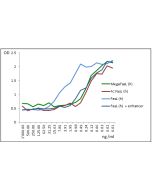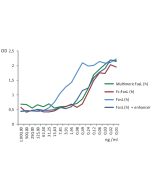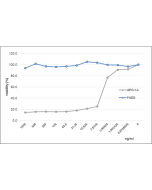Cookie Policy: This site uses cookies to improve your experience. You can find out more about our use of cookies in our Privacy Policy. By continuing to browse this site you agree to our use of cookies.
AdipoGen Life Sciences
Fas (human):Fc (human) (rec.)
As low as
300
CHF
CHF 300.00
In stock
Only %1 left
AG-40B-0082-C05050 µgCHF 300.00
AG-40B-0082-30503 x 50 µgCHF 600.00

| Product Details | |
|---|---|
| Synonyms | Tumor Necrosis Factor Receptor Superfamily Member 6; TNFRSF6; Apo-1 Antigen; CD95 |
| Product Type | Protein |
| Properties | |
| Source/Host | HEK 293 cells |
| Sequence |
The Fc portion of human IgG1 is fused to the C-terminus of human Fas (aa 26-170). |
| Crossreactivity |
Human Mouse |
| Specificity |
Binds human FasL with an ED50 of <5ng/ml. Binds mouse FasL. |
| Biological Activity |
Blocks the binding of FasL to Fas. |
| MW | ~47kDa (SDS-PAGE). |
| Purity | ≥95% (SDS-PAGE) |
| Endotoxin Content | <0.01EU/μg purified protein (LAL test; Lonza). |
| Concentration | 1mg/ml after reconstitution. |
| Reconstitution | Reconstitute with 50μl sterile water. |
| Formulation | Lyophilized. Contains PBS. |
| Protein Negative Control | |
| Other Product Data |
Uni-Prot link P25445: Fas (human) |
| Shipping and Handling | |
| Shipping | BLUE ICE |
| Short Term Storage | +4°C |
| Long Term Storage | -20°C |
| Handling Advice |
After reconstitution, prepare aliquots and store at -20°C. Avoid freeze/thaw cycles. Centrifuge lyophilized vial before opening and reconstitution. PBS containing at least 0.1% BSA should be used for further dilutions. |
| Use/Stability |
Stable for at least 6 months after receipt when stored at -20°C. Working aliquots are stable for up to 3 months when stored at -20°C. |
| Documents | |
| MSDS |
 Download PDF Download PDF |
| Product Specification Sheet | |
| Datasheet |
 Download PDF Download PDF |
Description
FasL is a cytokine that binds to Fas/TNFRSF6, a receptor that transduces the apoptotic signal into cells. FasL is involved in cytotoxic T cell mediated apoptosis and in T cell development.
Product References
- Decitabine treatment of glioma-initiating cells enhances immune recognition and killing: C. Riccadonna, et al.; PLOS One 11, e0162105 (2016)
- CART cells are prone to Fas- and DR5-mediated cell death: B.O. Tschumi, et al.; J. ImmunoTherapy Cancer 6, 71 (2018)






![CD95 [Fas] (human)-huIg Fusion Protein (preservative free)](https://adipogen.com/media/catalog/product/placeholder/default/adipogen_logo_bw_3.png)


